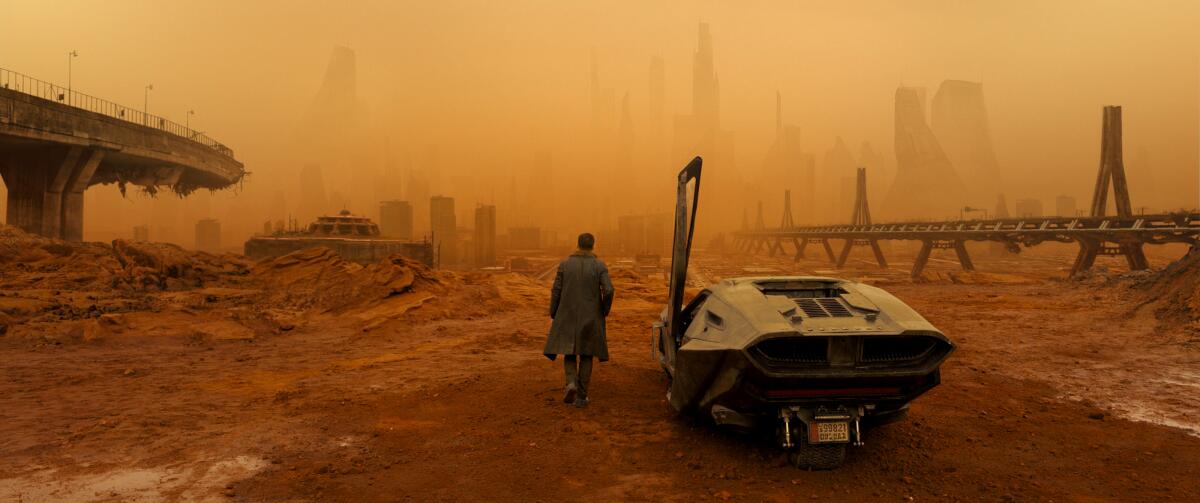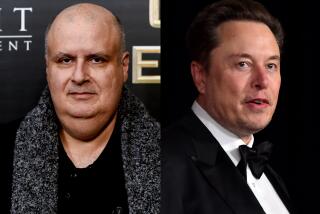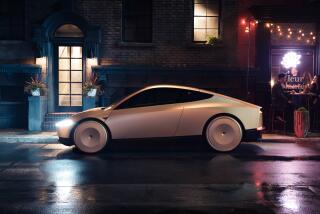‘Blade Runner 2049’ producer sues Elon Musk, Warner Bros. Discovery over Tesla Cybercab launch

A Los Angeles-based production company has sued Tesla, its Chief Executive Elon Musk, and Warner Bros. Discovery, alleging that the electric vehicle maker ripped off scenes from the 2017 film “Blade Runner 2049” to promote its new robotaxi.
Alcon Entertainment, which produced the film for Warner Bros., filed the copyright infringement lawsuit Monday in California.
The complaint accuses the Hollywood studio, Tesla and Musk of using artificial intelligence to generate an image resembling scenes from “Blade Runner 2049,” which Musk presented during a launch event for Tesla’s Cybercab on the Warner Bros. studio lot in Burbank. The livestreamed event took place Oct. 10 — shortly after Alcon said it denied a request from Warner Bros. Discovery to use a production photo from the sci-fi film to promote Tesla’s new product.
The National Highway Traffic Safety Administration is investigating Tesla’s autonomous driving technology after receiving reports of four crashes, including one that killed a pedestrian.
“Alcon refused all permissions and adamantly objected to Defendants suggesting any affiliation between [‘Blade Runner 2049’] and Tesla, Musk or any Musk-owned company,” the 52-page lawsuit reads.
“Defendants then used an apparently AI-generated faked image to do it all anyway.”
Representatives for New York City-based Warner Bros. Discovery and Austin-based Tesla did not immediately respond Monday to The Times’ requests for comment.
The production photo Warner Bros. Discovery asked to use depicts “Blade Runner 2049” star Ryan Gosling walking away from the camera across a desolate, dystopian landscape reduced to rubble and reddish dirt. Gosling wears a brown trench coat in character as a futuristic bounty hunter while approaching a city skyline shrouded in thick, orange smog.
The image from the Cybercab livestream shows a man — with a build and haircut similar to Gosling’s — wearing a brown trench coat and standing on red dirt while overlooking a city skyline enveloped in a thick, orange haze.
X, formerly known as Twitter, is closing its headquarters in San Francisco and moving some of its San Francisco employees to San José and Palo Alto. The departure is another blow to a city that has been buffeted by high-profile business departures.
During the Cybercab launch party, Musk also allegedly referenced “Blade Runner 2049” while introducing the vehicle to a global audience.
According to the complaint, Alcon refused the defendants’ request in part because it considers Musk problematic.
“Any prudent brand considering any Tesla partnership has to take Musk’s massively amplified, highly politicized, capricious and arbitrary behavior, which sometimes veers into hate speech, into account,” the filing reads.
“If, as here, a company or its principals do not actually agree with Musk’s extreme political and social views, then a potential brand affiliation with Tesla is even more issue-fraught.”
A lot is riding on the Cybercab for Musk, who has been selling unfulfilled promises of autonomous vehicles for years. Although Tesla’s sales of its signature electric cars stumbled early in 2024, the company has an $800-billion market capitalization built largely on the expectation that it will be able to overtake competitors to dominate the burgeoning robotaxi market. Whether Tesla is anywhere close to completing its push to develop the technology needed to do so, however, remains an open question.
“It was hardly coincidental that the only specific Hollywood film which Musk actually discussed to pitch his new, fully autonomous, AI-driven cybercab was [‘Blade Runner 2049’],” the complaint reads, “a film which just happens to feature a strikingly-designed, artificially intelligent, fully autonomous car throughout the story.”
Alcon is demanding a jury trial and potentially hundreds of thousands of dollars in damages.
Times staff writer Caroline Petrow-Cohen contributed to this report.
More to Read
Inside the business of entertainment
The Wide Shot brings you news, analysis and insights on everything from streaming wars to production — and what it all means for the future.
You may occasionally receive promotional content from the Los Angeles Times.













